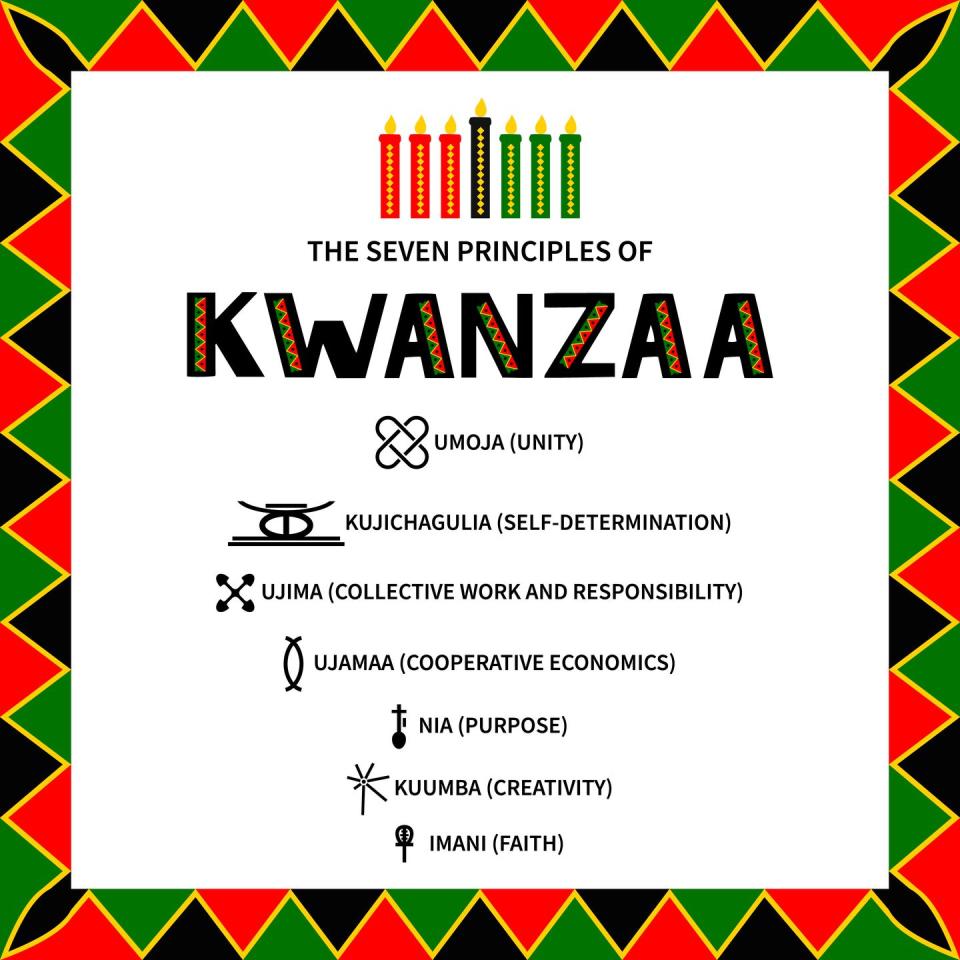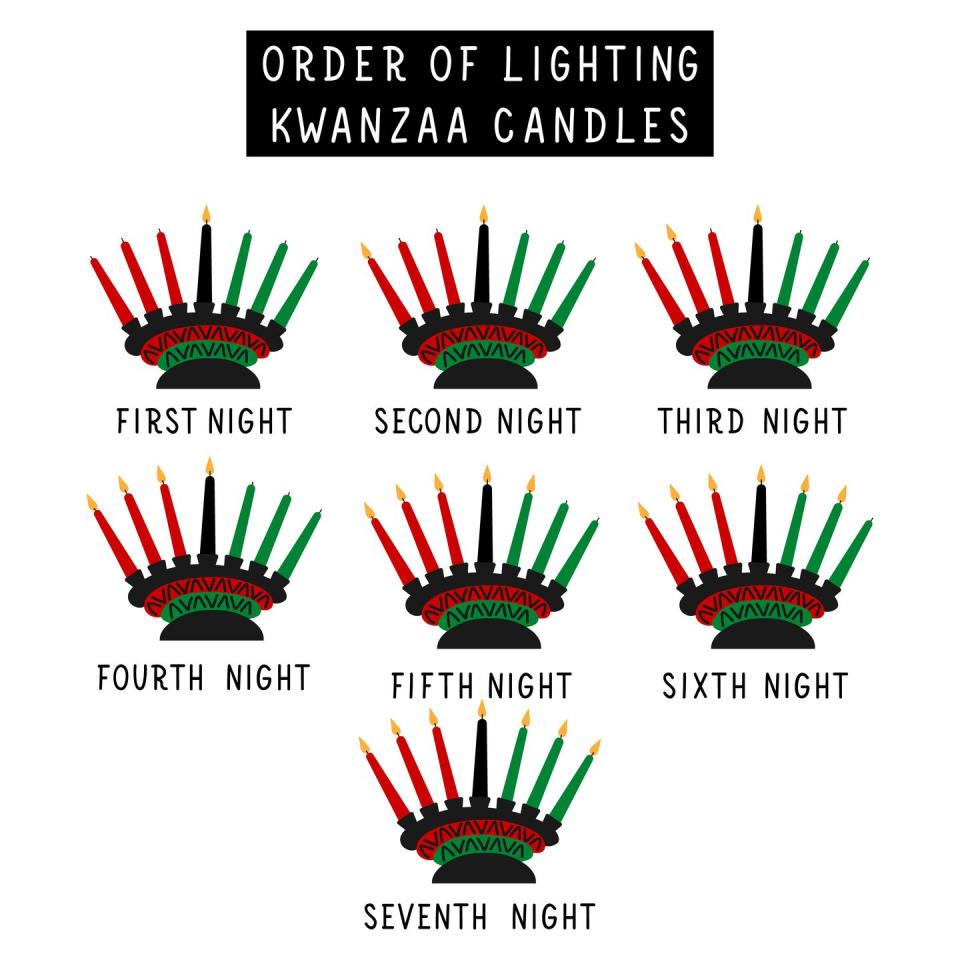Celebrating Kwanzaa Is All About Celebrating Yourself

With the holiday season in full swing, you may be looking forward to your parties, dinners, and other cheer-filled festivities. But for many people, this time of year is also an opportunity to practice gratitude and spirituality.
Established in 1966, Kwanzaa is celebrated for seven days every year from December 26 through January 1. The word Kwanzaa comes from the word "first" in Swahili and is inspired by the start of the harvest season in Africa. But at its core, Kwanzaa is about more than a harvest or feast.
The holiday was created with the intention of connecting with the past to prepare for the future while acknowledging culture and identity, says Donald Harrell, an adjunct Africana Studies professor at University of Central Florida. However, it wasn't recognized as a mainstream holiday until the 1980s.
The shift in acceptance was revolutionary for the Black community. "Your identity with yourself gives you power that was [against] the goals of those who sought to oppress, marginalize, and keep people in a second class position," explains Harrell.
One way Kwanzaa puts identity at the forefront of its celebration is through the honoring and remembering of ancestors. The African belief is that as long as those who came before are remembered amongst the living, they are present today. Ancestors are also seen as spirit guides and forces that will intervene when needed.
Ahead, here's everything to know about Kwanzaa, including the seven core principles, important symbols, and details on how you can celebrate it this year.
Meet the experts: Donald Harrell is an adjunct Africana Studies professor at University of Central Florida.
Maulana Karenga, PhD, is the creator of Kwanzaa, and a professor and chair of the Department of Africana Studies at California State University, Long Beach.
What are the seven core principles of Kwanzaa?
The seven core principles that are honored each of the seven days are key to what makes Kwanzaa so special. They are best described as a communitarian African value system that offers rightful, reciprocal, and rewarding ways to relate to one another and the world, says Maulana Karenga, PhD, the creator of Kwanzaa, and a professor and chair of the Department of Africana Studies at California State University, Long Beach.
Each principle is rooted in Kawaida, which is an ongoing synthesis of the best of African thought and practice in constant exchange with the world, according to The Organization Us. "[The principles] teach us that this is our duty to know our past and honor it; to engage our present and improve it; and to imagine a whole new future and to forge it in the most ethical, effective, and expansive ways," adds Karenga.
These are the seven core principles, according to the official Kwanzaa website:
Umoja (December 26): Umoja translates to "unity." In this case, it refers to unity of community, family, country, and race.
Kujichagulia (December 27): This terms means " self-determination" and highlights the importance of knowing one's self and being a clear advocate for who they are. It is used "to define ourselves, name ourselves, create for ourselves and speak for ourselves."
Ujima (December 28): Ujima refers to "collective work and responsibility" and the commitment that one has to their community. It honors the process of identifying problems and solving them together.
Ujamaa (December 29): This word translates to "cooperative economics" and highlights the importance of creating and maintaining shops and other business so that they all benefit from community business.
Nia (December 30): Nia means "purpose." It's honored to "make our collective vocation the building and developing of our community in order to restore our people to their traditional greatness."
Kuumba (December 31): This translates to "creativity." It reflects on the commitment to use creativity to leave each person's community more beautiful and beneficial than how it was when it was first inherited.
Imani (January 1): At its core, the word Imani translates to "faith," but in detail, it refers to the commitment of believing in "our people, our parents, our teachers, our leaders and the righteousness and victory of our struggle."

What are the seven symbols of Kwanzaa?
Along with the principles, there are seven symbols that are representative of African culture based on their community values and other concepts. These are the seven symbols, according to the official Kwanzaa website.
Mazao (Crops): A reflection of the African harvest celebrations, the crops symbolize the rewards of communal labor.
Mkeka (The Mat): The mat is symbolic of the foundation built through tradition and history of African culture.
Kinara (The Candle Holder): The Kinara is symbolic of African roots.
Muhindi (Corn): The corn is used to represent children and the future that is possible because of them.
Kikombe cha Umoja (The Unity Cup): This cup is used to honor ancestors and represents how the connection to the living and the dead makes all else possible.
Mishumaa Saba (The Seven Candles): Each of the seven candles represent each of the seven core principles listed above.
Zawadi (Gifts): This symbolizes the labor of the parents and the commitments kept by their children.
How can I celebrate Kwanzaa this year?
If you're hung up over the "right" way to celebrate Kwanzaa, just know that while the traditional route is always available, you can still be creative with it.
It's encouraged to have open discussions around whichever principle is being honored, but Harrell notes that having the proper items, such as the Kinara and the mat, is a good place to start. There is chanting or an exchanging of gifts (Zawadi), but the big thing is the lighting of the candles during the seven days. "Stick to the plan," says Harrell, but don't feel bad about it if you miss a day.

There are also households and community spaces that host Kwanzaa celebrations that are open to the public. Most people bounce around to different locations on different days since many people host for only on one or two days of Kwanzaa. And if you're opting to go somewhere else this year, you'll notice that food plays a major role in the whole process.
"Given that Kwanzaa is an African American and pan-African holiday that celebrates family, community, and culture, the foods are unlimited and are self-consciously drawn from throughout the world-African community," says Karenga.
Some foods that you can find at the dinner table include biscuits, corn bread, injera, okra, collard greens, squash, jambalaya, Jollof rice, yams, plantains, curry chicken, mafe, and fish. Karenga also notes that pork is usually avoided for those that have restrictions.
Delicious foods and gifts aside, Kwanzaa is all about being intentional, reflecting on everything you have, and giving thanks to your ancestors that have come before you. "There's no one set way [to celebrate], but one should follow the principles of [each] day and make sure the essential elements are in place," explains Harrell. "Celebrate yourself, make it all about Black joy, and acknowledge that we are people who have our own identity and that our destiny is a collective destiny."
You Might Also Like
